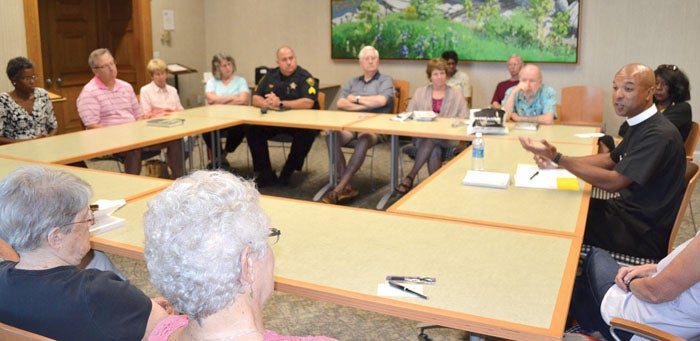Discussion: We must use history to move forward
Published 12:00 am Sunday, August 20, 2017

- Carol Palmer/Hood Theological Seminary Dr. Ken Walden, right, in clerical collar, talks about 'Blood Done Sign My Name' at Rowan Public Library as part of the 2017 Summer Reading Challenge.
By Deirdre Parker Smith
deirdre.smith@salisbury Post.com
It started with Dr. Ken Walden saying, “The library is one of the most integrated places in Salisbury,” and the group of 25 or so readers agreeing.
Walden was at Rowan Public Library Tuesday night to talk about the third and final book in the Summer Reading Challenge, “Blood Done Sign My Name,” by Dr. Timothy Tyson.
The book is an account of a brutal, racially fueled murder in Oxford, N.C., in 1970. Tyson was 10 years old at the time, and his father, Vernon, was a Methodist minister who had been trying to integrate his church.
In that small town, a black Vietnam veteran, Henry Marrow, was brutally murdered by a white store owner, his son and another man. The trial was a farce, and the racial tension engendered by the events split the town apart, with public facilities closing rather than integrating. Eventually, Vernon Tyson had to leave his church and the town.
Walden, a Methodist minister and professor at Hood Theological Seminary, praised author Timothy Tyson, who wrote the book in 2004, for his extensive credentials.
Tyson was there. He went back to Oxford to talk to people who lived through the awful event. He went to the places where various things happened. He has taught African American studies all over the South. He now teaches at Duke Divinity School and at the University of North Carolina at Chapel Hill.
Tyson’s most recent work is “The Blood of Emmett Till,” which explores yet another shocking, racially motivated murder in 1955.
Walden said Tyson “researches incidents many of us would rather turn a blind eye to.”
Marrow, the victim in “Blood Done Sign My Name,” was just 23. He had a wife and two daughters, with another child on the way. He had joined the Army at 19. He was just like many other young men of the era, except his skin was not white.
Tyson, Walden said, gave voice to all different parts of the community in his effort to be balanced.
“He does not automatically demonize any party,” Walden said. “They were doing the best they could, considering who they were.”
Much of the book is about Tyson’s father, who held on to his beliefs that all people were created equally, no matter what resistance he met. Vernon took his children to a Ku Klux Klan rally to show them “what hate looks like.”
The era of Henry Marrow was also the era of the Wilmington 10, 10 people falsely convicted and imprisoned following the frebombing of a grocery store.
“This book is a testament to a family that talked about issues, but still had problems understanding it,” said Dr. Susan Lee.
“Our children observe us.“ Walden said. “They see what we do and say and pay attention to what we are not doing and not saying.”
He read from the book an analogy often used in describing racism, that white supremacy is so systemic that it is unconscious. It’s like asking a fish if the water is wet. Wet is the fish’s world. It does not understand what wet means.
Walden asked, “Am I more influenced by my faith, or by my race? … It’s an important question. … There’s a tension there for all of us.”
Members of the group began talking about current racial issues, pointing to the recent events in Charlottesville, Va. Walden said that integration was made law in 1954, but in 1970, that didn’t help Henry Marrow, and in 2017, we are still struggling.
But he also offered hope. “Two hundred years of progress, from the late 1700s to now, is lightning speed, if you consider it. Now we are challenged to keep it up. Look at Obama, just 40 years after blacks were allowed to vote, the nation elected a black president.” The murder may have happened in 1970, but the issues in the book are relevant today.
“We see shadows of what’s going on now,” Walden said. “I hope that we continue as residents and stakeholders to progress, that we try our best not to reflect on what happened in Oxford, but to be more civilized because of it.”
Others agreed. We must remember the story, and the process, and that it is a process.
“We have to tell our stories and remember to push on,” Walden said.
“Be honest, pat yourself on the back, because you need it, but also to spur yourself on.”


